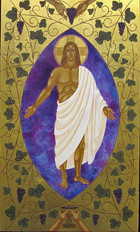The True Vine
Wine is described in the Bible as a gift from God “that gladdens the heart of man” (Psalms 102: 14, NIV). References to grapes, vines, vineyards, and wine can be traced through the Scriptures from the first lurid account of Noah’s drunken nakedness in Genesis 9 to a final apocalyptic vision of Angels, harvesting the grapes of wrath in Revelation 14. Lovers meet in a blossoming vineyard in Song of Songs, and Jesus turns water to wine at the wedding in Cana in his first miracle recorded in John 3. The vineyard comes to represent Israel in the Old Testament, and Jesus uses the same image in the Parable of the Wicked Tenants. He also compares the Kingdom of God to a vineyard, where laborers are called to work and receive extravagant wages from the owner. In the most sacred rite of Christianity, wine becomes the blood of Christ, which we drink in remembrance of his death, for he is The True Vine, giving life to those who abide in him as branches.
Illustrating the "vintage" scriptural texts below are images from around the world. There is a carved cross embellished with grape vines from Bali and a reverse glass icon from Romania, depicting Christ as the Mystical Winepress. The vineyard parables feature in a stencil print from Japanese Artist Sadao Watanabe, an etching from British Printmaker William Strang, and an Art Deco poster by Belgian Artist Jos Speybrouck. Modern Master Henri Matisse is represented by a lithograph of a stained glass window design of intertwined vines and American Artist Jaspar Johns by a print, where a cup, resembling the chalice at the foot of the Cross in the Isenheim Altarpiece, takes shape from two opposing profiles of Pablo Picasso. We see Christ the True Vine in a visionary watercolor by German-American Ilustrator Arthur Becher and in a contemporary icon of the sacred mystery of the Eucharist by American Icon-maker Jodi Simmons.
He makes grass grow for the cattle, and plants for man to cultivate--bringing forth food from the earth: wine that gladdens the heart of man, oil to make his face shine, and bread that sustains his heart. (Psalm 104: 14-15, NIV)
Let us go early to the vineyards to see if the vines have budded, if their blossoms have opened, and if the pomegranates are in bloom-- there will I give thee my love. (Song of Songs 7:12 NIV)
The Lord said to Moses, “Send some men to explore the land of Canaan, which I am giving to the Israelites.” When Moses sent them to explore Canaan, he said, “Go up through the Negev and on into the hill country. See what the land is like and whether the people who live there are strong or weak, few or many. Do your best to bring back some fruit of the land.” (It was the season for the first ripe grapes.) When they reached the Valley of Eshcol, they cut off a branch bearing a single cluster of grapes. Two of them carried it on a pole between them along with some pomegranates and figs. That place was called the Valley of Eshcol because of the cluster of grapes the Israelites cut off there. At the end of forty days they returned from exploring the land. (Numbers 13: 1-2, 17, 20, 23-25, NIV)
Now will I sing to my wellbeloved a song of my beloved touching his vineyard. My wellbeloved hath a vineyard in a very fruitful hill: And he fenced it, and gathered out the stones thereof, and planted it with the choicest vine, and built a tower in the midst of it, and also made a winepress therein: and he looked that it should bring forth grapes, and it brought forth wild grapes. And now, O inhabitants of Jerusalem, and men of Judah, judge, I pray you, betwixt me and my vineyard. What could have been done more to my vineyard, that I have not done to it? Wherefore, when I looked that it should bring forth grapes, brought it forth wild grapes? And now go to; I will tell you what I will do to my vineyard: I will take away the hedge thereof, and it shall be eaten up; and break down the wall thereof, and it shall be trodden down: And I will lay it waste: it shall not be pruned nor digged; but there shall come up briers and thorns: I will also command the clouds that they not rain upon it. For the vineyard of the Lord of hosts is the house of Israel, and the men of Judah his pleasant plant: and he looked for judgment, but behold oppression; for righteousness, but behold a cry. (Isaiah 5:1-7, KJV)
[Jesus] went on to tell the people this parable: “A man planted a vineyard, rented it to some farmers and went away for a long time. At harvest time he sent a servant to the tenants so they would give him some of the fruit of the vineyard. But the tenants beat him and and sent him away empty-handed. He sent another servant, but that one also they beat and treated shamefully and sent away empty-handed. He sent still a third, and they wounded him and threw him out. Then the owner said, ‘What shall I do? I will send my son, whom I love: perhaps they will respect him.’ But when the tenants saw him, they talked the matter over. ’This is the heir,’ they said, ‘Let’s kill him, and the inheritance will be ours.’ So they threw him out of the vineyard and killed him. What then will the owner of the vineyard do to them? He will come and kill those tenants and give the vineyard to others.” (Luke 20: 9-16, NIV)
In the hand of the Lord is a cup full of foaming wine mixed with spices; he pours it out, and all the wicked of the earth drink it down to its very dregs. (Psalm 75: 8, NIV)
And another angel came out from the altar, which had power over fire; and cried with a loud cry to him that had the sharp sickle, saying, Thrust in thy sharp sickle, and gather the cluster of the vine of the earth; for her grapes are fully ripe. And the angel thrust in his sickle into the earth, and gathered the vine of the earth, and cast it into the great winepress of the wrath of God. And the winepress was trodden without the city, and blood came out of the winepress. (Revelation 14: 18-20 KJV)
Behold the days come, saith the Lord, that the plowman shall overtake the reaper, and the treader of grapes him that soweth seed; and the mountains shall drop sweet wine, and all the hills shall melt. And I will bring again the captivity of my people of Israel, and they shall build the waste cities, and inhabit them; and they shall plant vineyards, and drink the wine thereof; they shall all make gardens, and eat the fruit of them. And I will plant them upon their land, and they shall no more be pulled up out of their land which I have given them, saith the Lord thy God. (Amos 9 :13-15, KJV)
"What do you think? There was a man who had two sons. He went to the first and said, 'Son, go and work today in the vineyard.' 'I will not,' he answered, but later he changed his mind and went. Then the father went to the other son and said the same thing. He answered, 'I will, sire, but he did not go.' Which of the two did what his father wanted?" (Matthew 21: 28-31, NIV)
“For the kingdom of heaven is like a landowner who went out early in the morning to hire men to work in his vineyard. He agreed to pay them a denarius for the day and sent them into his vineyard. About the third hour he went out and saw others standing in the marketplace doing nothing. He told them, ‘You also go and work in my vineyard, and I will pay you whatever is right.’ So they went. He went out again about the sixth hour and the ninth hour and the same thing. About the eleventh hour he went out and found still others standing around. He asked them, ‘Why have you been standing here all day long doing nothing?’ ‘Because no one has hired us,’ they answered. He said to them, ‘You also go and work in my vineyard.’ When the evening came, the owner of the vineyard said to his foreman, ‘Call the workers and pay them their wages, beginning with the last ones hired and going on to the first.’ The workers who were hired about the eleventh hour came and each received a denarius. So when those came who were hired first, they expected to receive more. But each one of them also received a denarius. When they received it, they began to grumble against the landowner. ‘These men who were hired last worked only one hour,’ they said, ‘and you have made them equal to us who have borne the burden of the work and the heat of the day.’ But he answered one of them. ‘Friend, I am not being unfair to you. Didn’t you agree to work for a denarius? Take your pay and go. I want to give the man who was hired last the same as I gave you. Don’t I have the right to do what I want with my own money? Or are you envious because I am generous?’ So the last will be first, and the first will be last.”
(Matthew 20: 1-16, NIV)
No one pours new wine into old wineskins. If he does, the wine will burst the skins, and both the wine and the wineskins will be ruined. No, he pours new wine into new wineskins.
(Mark 2: 22, NIV)
And as they were eating, Jesus took bread, and blessed it, and brake it, and gave it to the disciples, and said, Take, eat; this is my body. And he took the cup, and gave thanks, and gave it to them, saying, Drink ye all of it; For this is my blood of the new testament, which is shed for many for the remission of sins. But I say unto you, I will not drink henceforth of this fruit of the vine, until that day when I drink it new with you in my Father’s kingdom. (Matthew 26: 26-29, KJV)
For I received from the Lord what I also passed on to you. The Lord Jesus Christ, on the night he was betrayed, took bread and when he had given thanks, he broke it and said, “This is my body, which is for you; do this in remembrance of me.“ In the same way, after supper he took the cup, saying: “This cup is the new covenant in my blood: do this whenever you drink it, in remembrance of me.“ For whenever you eat this bread and drink this cup, you proclaim the Lord’s death until he comes. (1 Corinthians 11: 25, NIV)
“I am the true vine, and my Father is the husbandman. Every branch in me that beareth not fruit he taketh away; and every branch that beareth fruit, he purgeth it, that it may bring forth more fruit. Now ye are clean through the word which I have spoken unto you. Abide in me, and I in you. As the branch cannot bear fruit of itself, except it abide in the vine; no more can ye, except ye abide in me. I am the vine, ye are the branches; He that abideth in me, and I in him, the same bringeth forth much fruit; for without me ye can do nothing. If a man abide not in me, he is cast forth as a branch, and is withered; and men gather them, and cast them into the fire, and they are burned. If ye abide in me, and my words abide in you, ye shall ask what ye will, and it shall be done unto you. Herein is my Father glorified, that ye bear much fruit; so shall ye be my disciples.” (John 15: 1-8, NIV)
From The Holy Bible in the King James Version, [KJV](Thomas Nelson: 1976) and The Holy Bible: New International Version, [NIV](New York Bible Society International: 1973)
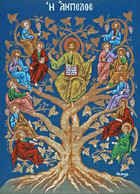
Pefkis Workshop
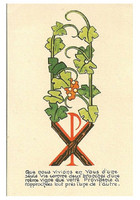
Unknown French Illustrator
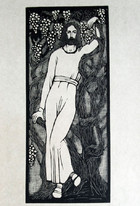
Daniel Greiner
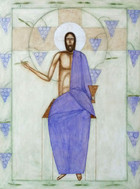
Natalya Rusetka
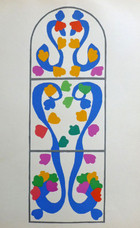
Henri Matisse
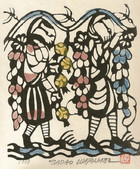
Sadao Watanabe
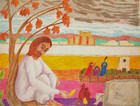
John Kohan
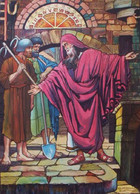
Jos Speybrouck
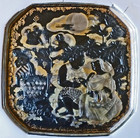
Bjorn Wiinblad
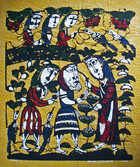
Sadao Watanabe

William Strang
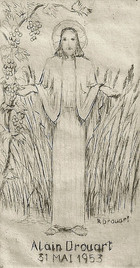
Raphael Drouart
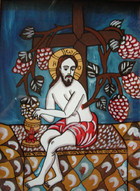
Constanta Rodica
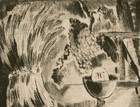
Hermine David
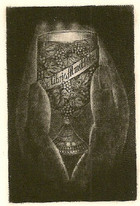
Tadeusz Szumarski
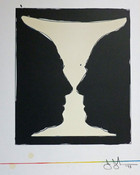
Jasper Johns
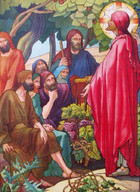
Jos Speybrouck
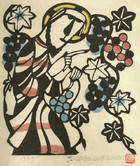
Sadao Watanabe
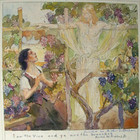
Arthur Ernst Becher
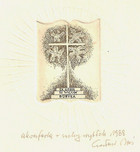
Czeslaw Wos
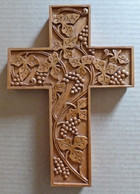
Nyoman Subrata
